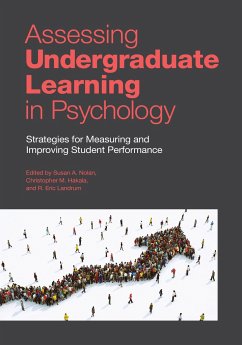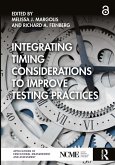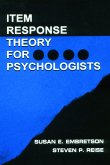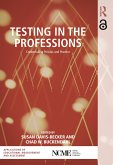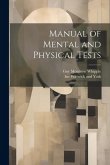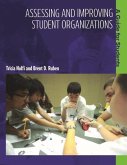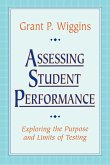Assessing Undergraduate Learning in Psychology: Strategies for Measuring and Improving Student Performance
Herausgeber: Nolan, Susan A.; Landrum, R. Eric; Hakala, Christopher M.
Assessing Undergraduate Learning in Psychology: Strategies for Measuring and Improving Student Performance
Herausgeber: Nolan, Susan A.; Landrum, R. Eric; Hakala, Christopher M.
- Broschiertes Buch
- Merkliste
- Auf die Merkliste
- Bewerten Bewerten
- Teilen
- Produkt teilen
- Produkterinnerung
- Produkterinnerung
This book will help undergraduate psychology faculty and administrators address three types of assessment pressures—individual, institutional, international—that they face when designing courses and curricula around student learning goals.
Andere Kunden interessierten sich auch für
![Integrating Timing Considerations to Improve Testing Practices Integrating Timing Considerations to Improve Testing Practices]() Integrating Timing Considerations to Improve Testing Practices64,99 €
Integrating Timing Considerations to Improve Testing Practices64,99 €![Item Response Theory Item Response Theory]() Susan E. EmbretsonItem Response Theory80,99 €
Susan E. EmbretsonItem Response Theory80,99 €![Testing in the Professions Testing in the Professions]() Testing in the Professions86,99 €
Testing in the Professions86,99 €![Manual of Mental and Physical Tests Manual of Mental and Physical Tests]() Guy Montrose WhippleManual of Mental and Physical Tests27,99 €
Guy Montrose WhippleManual of Mental and Physical Tests27,99 €![Assessing and Improving Student Organizations Assessing and Improving Student Organizations]() Brent D RubenAssessing and Improving Student Organizations29,99 €
Brent D RubenAssessing and Improving Student Organizations29,99 €![Assessing Student Performance Assessing Student Performance]() Grant P WigginsAssessing Student Performance49,99 €
Grant P WigginsAssessing Student Performance49,99 €![Own Your Psychology Major!: A Guide to Student Success Own Your Psychology Major!: A Guide to Student Success]() Glenn GeherOwn Your Psychology Major!: A Guide to Student Success33,99 €
Glenn GeherOwn Your Psychology Major!: A Guide to Student Success33,99 €-
-
-
This book will help undergraduate psychology faculty and administrators address three types of assessment pressures—individual, institutional, international—that they face when designing courses and curricula around student learning goals.
Hinweis: Dieser Artikel kann nur an eine deutsche Lieferadresse ausgeliefert werden.
Hinweis: Dieser Artikel kann nur an eine deutsche Lieferadresse ausgeliefert werden.
Produktdetails
- Produktdetails
- Verlag: American Psychological Association (APA)
- Seitenzahl: 278
- Erscheinungstermin: 11. August 2020
- Englisch
- Abmessung: 251mm x 175mm x 15mm
- Gewicht: 499g
- ISBN-13: 9781433832277
- ISBN-10: 1433832275
- Artikelnr.: 58018508
- Herstellerkennzeichnung
- Libri GmbH
- Europaallee 1
- 36244 Bad Hersfeld
- gpsr@libri.de
- Verlag: American Psychological Association (APA)
- Seitenzahl: 278
- Erscheinungstermin: 11. August 2020
- Englisch
- Abmessung: 251mm x 175mm x 15mm
- Gewicht: 499g
- ISBN-13: 9781433832277
- ISBN-10: 1433832275
- Artikelnr.: 58018508
- Herstellerkennzeichnung
- Libri GmbH
- Europaallee 1
- 36244 Bad Hersfeld
- gpsr@libri.de
Edited by Susan A. Nolan, Christopher M. Hakala, and R. Eric Landrum
Contributors
Introduction: Assessment Assessment Everywhere—And What Are We to Think?
Susan A. Nolan, Christopher M. Hakala, and R. Eric Landrum
Part I. Institutional Approaches
Chapter 1. Scholarship of Teaching and Learning and Assessment: Advancing a
Collaborative Model
Regan A. R. Gurung
Chapter 2. A Framework for Setting Educational Priorities
Melissa Beers
Chapter 3. The Sound and Fury of Academic Program Reviews: What They Reveal
about Assessment and Accountability
Jane S. Halonen and Dana S. Dunn
Chapter 4. Replacing the Term Formative Assessment: A Modest Proposal
Rob McEntarffer
Chapter 5. How to Create a Culture of Assessment
Jason S. Todd and Elizabeth Yost Hammer
Chapter 6. Overcoming Obstacles That Stop Student Learning: The Bottleneck
Model of Structural Reform
Claudia J. Stanny
Chapter 7. Backward Design, the Science of Learning, and the Assessment of
Student Learning
Catherine E. Overson and Victor A. Benassi
Part II. Individual Approaches
Chapter 8. Assessment as a Pedagogical Science: A Stealthy Approach to
Studying Effective Teaching
Bridgette Martin Hard
Chapter 9. Evidence-Based Teaching and Course Design: Using Data to
Develop, Implement, and Refine University Courses
Danae L. Hudson
Chapter 10. A Taxonomy for Assessing Educational Change in Psychology
Raymond J. Shaw
Chapter 11. Using Formative Self-Assessment to Improve Teaching and
Learning in Educational Psychology Courses
Eva Seifried and Birgit Spinath
Part III. International Approaches
Chapter 12. Assessing Learning Outcomes in Undergraduate Psychology
Education: Lessons Learned From Five Countries
Jacquelyn Cranney, Julie A. Hulme, Julia Suleeman, Remo Job, and Dana S.
Dunn
Chapter 13. Applying the Assessment Design Decisions Framework
Internationally
Jacquelyn Cranney, Dana S. Dunn, and Suzanne C. Baker
Chapter 14. Measuring the Generic Skills of Higher Education Students and
Graduates: Implementation of CLA+ International
Doris Zahner, Dirk Van Damme, Roger Benjamin, and Jonathan Lehrfeld
Chapter 15. Interdisciplinary Innovations in Formative and Summative
Assessment: The Beliefs, Events, and Values Inventory; VALUE Rubrics; and
the Cultural Controllability Scale
Kris Acheson, Ashley Finley, Louis Hickman, Lee Sternberger, and Craig
Shealy
Afterword: What’s Next?
Susan A. Nolan, Christopher M. Hakala, and R. Eric Landrum
Index
About the Editors
Introduction: Assessment Assessment Everywhere—And What Are We to Think?
Susan A. Nolan, Christopher M. Hakala, and R. Eric Landrum
Part I. Institutional Approaches
Chapter 1. Scholarship of Teaching and Learning and Assessment: Advancing a
Collaborative Model
Regan A. R. Gurung
Chapter 2. A Framework for Setting Educational Priorities
Melissa Beers
Chapter 3. The Sound and Fury of Academic Program Reviews: What They Reveal
about Assessment and Accountability
Jane S. Halonen and Dana S. Dunn
Chapter 4. Replacing the Term Formative Assessment: A Modest Proposal
Rob McEntarffer
Chapter 5. How to Create a Culture of Assessment
Jason S. Todd and Elizabeth Yost Hammer
Chapter 6. Overcoming Obstacles That Stop Student Learning: The Bottleneck
Model of Structural Reform
Claudia J. Stanny
Chapter 7. Backward Design, the Science of Learning, and the Assessment of
Student Learning
Catherine E. Overson and Victor A. Benassi
Part II. Individual Approaches
Chapter 8. Assessment as a Pedagogical Science: A Stealthy Approach to
Studying Effective Teaching
Bridgette Martin Hard
Chapter 9. Evidence-Based Teaching and Course Design: Using Data to
Develop, Implement, and Refine University Courses
Danae L. Hudson
Chapter 10. A Taxonomy for Assessing Educational Change in Psychology
Raymond J. Shaw
Chapter 11. Using Formative Self-Assessment to Improve Teaching and
Learning in Educational Psychology Courses
Eva Seifried and Birgit Spinath
Part III. International Approaches
Chapter 12. Assessing Learning Outcomes in Undergraduate Psychology
Education: Lessons Learned From Five Countries
Jacquelyn Cranney, Julie A. Hulme, Julia Suleeman, Remo Job, and Dana S.
Dunn
Chapter 13. Applying the Assessment Design Decisions Framework
Internationally
Jacquelyn Cranney, Dana S. Dunn, and Suzanne C. Baker
Chapter 14. Measuring the Generic Skills of Higher Education Students and
Graduates: Implementation of CLA+ International
Doris Zahner, Dirk Van Damme, Roger Benjamin, and Jonathan Lehrfeld
Chapter 15. Interdisciplinary Innovations in Formative and Summative
Assessment: The Beliefs, Events, and Values Inventory; VALUE Rubrics; and
the Cultural Controllability Scale
Kris Acheson, Ashley Finley, Louis Hickman, Lee Sternberger, and Craig
Shealy
Afterword: What’s Next?
Susan A. Nolan, Christopher M. Hakala, and R. Eric Landrum
Index
About the Editors
Contributors
Introduction: Assessment Assessment Everywhere—And What Are We to Think?
Susan A. Nolan, Christopher M. Hakala, and R. Eric Landrum
Part I. Institutional Approaches
Chapter 1. Scholarship of Teaching and Learning and Assessment: Advancing a
Collaborative Model
Regan A. R. Gurung
Chapter 2. A Framework for Setting Educational Priorities
Melissa Beers
Chapter 3. The Sound and Fury of Academic Program Reviews: What They Reveal
about Assessment and Accountability
Jane S. Halonen and Dana S. Dunn
Chapter 4. Replacing the Term Formative Assessment: A Modest Proposal
Rob McEntarffer
Chapter 5. How to Create a Culture of Assessment
Jason S. Todd and Elizabeth Yost Hammer
Chapter 6. Overcoming Obstacles That Stop Student Learning: The Bottleneck
Model of Structural Reform
Claudia J. Stanny
Chapter 7. Backward Design, the Science of Learning, and the Assessment of
Student Learning
Catherine E. Overson and Victor A. Benassi
Part II. Individual Approaches
Chapter 8. Assessment as a Pedagogical Science: A Stealthy Approach to
Studying Effective Teaching
Bridgette Martin Hard
Chapter 9. Evidence-Based Teaching and Course Design: Using Data to
Develop, Implement, and Refine University Courses
Danae L. Hudson
Chapter 10. A Taxonomy for Assessing Educational Change in Psychology
Raymond J. Shaw
Chapter 11. Using Formative Self-Assessment to Improve Teaching and
Learning in Educational Psychology Courses
Eva Seifried and Birgit Spinath
Part III. International Approaches
Chapter 12. Assessing Learning Outcomes in Undergraduate Psychology
Education: Lessons Learned From Five Countries
Jacquelyn Cranney, Julie A. Hulme, Julia Suleeman, Remo Job, and Dana S.
Dunn
Chapter 13. Applying the Assessment Design Decisions Framework
Internationally
Jacquelyn Cranney, Dana S. Dunn, and Suzanne C. Baker
Chapter 14. Measuring the Generic Skills of Higher Education Students and
Graduates: Implementation of CLA+ International
Doris Zahner, Dirk Van Damme, Roger Benjamin, and Jonathan Lehrfeld
Chapter 15. Interdisciplinary Innovations in Formative and Summative
Assessment: The Beliefs, Events, and Values Inventory; VALUE Rubrics; and
the Cultural Controllability Scale
Kris Acheson, Ashley Finley, Louis Hickman, Lee Sternberger, and Craig
Shealy
Afterword: What’s Next?
Susan A. Nolan, Christopher M. Hakala, and R. Eric Landrum
Index
About the Editors
Introduction: Assessment Assessment Everywhere—And What Are We to Think?
Susan A. Nolan, Christopher M. Hakala, and R. Eric Landrum
Part I. Institutional Approaches
Chapter 1. Scholarship of Teaching and Learning and Assessment: Advancing a
Collaborative Model
Regan A. R. Gurung
Chapter 2. A Framework for Setting Educational Priorities
Melissa Beers
Chapter 3. The Sound and Fury of Academic Program Reviews: What They Reveal
about Assessment and Accountability
Jane S. Halonen and Dana S. Dunn
Chapter 4. Replacing the Term Formative Assessment: A Modest Proposal
Rob McEntarffer
Chapter 5. How to Create a Culture of Assessment
Jason S. Todd and Elizabeth Yost Hammer
Chapter 6. Overcoming Obstacles That Stop Student Learning: The Bottleneck
Model of Structural Reform
Claudia J. Stanny
Chapter 7. Backward Design, the Science of Learning, and the Assessment of
Student Learning
Catherine E. Overson and Victor A. Benassi
Part II. Individual Approaches
Chapter 8. Assessment as a Pedagogical Science: A Stealthy Approach to
Studying Effective Teaching
Bridgette Martin Hard
Chapter 9. Evidence-Based Teaching and Course Design: Using Data to
Develop, Implement, and Refine University Courses
Danae L. Hudson
Chapter 10. A Taxonomy for Assessing Educational Change in Psychology
Raymond J. Shaw
Chapter 11. Using Formative Self-Assessment to Improve Teaching and
Learning in Educational Psychology Courses
Eva Seifried and Birgit Spinath
Part III. International Approaches
Chapter 12. Assessing Learning Outcomes in Undergraduate Psychology
Education: Lessons Learned From Five Countries
Jacquelyn Cranney, Julie A. Hulme, Julia Suleeman, Remo Job, and Dana S.
Dunn
Chapter 13. Applying the Assessment Design Decisions Framework
Internationally
Jacquelyn Cranney, Dana S. Dunn, and Suzanne C. Baker
Chapter 14. Measuring the Generic Skills of Higher Education Students and
Graduates: Implementation of CLA+ International
Doris Zahner, Dirk Van Damme, Roger Benjamin, and Jonathan Lehrfeld
Chapter 15. Interdisciplinary Innovations in Formative and Summative
Assessment: The Beliefs, Events, and Values Inventory; VALUE Rubrics; and
the Cultural Controllability Scale
Kris Acheson, Ashley Finley, Louis Hickman, Lee Sternberger, and Craig
Shealy
Afterword: What’s Next?
Susan A. Nolan, Christopher M. Hakala, and R. Eric Landrum
Index
About the Editors

